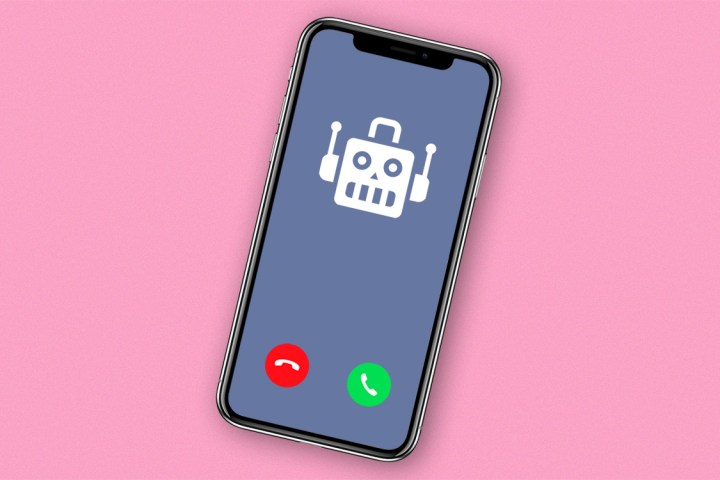
The Federal Communications Commission voted Thursday to allow cell phone companies to block robocalls by default, but the nation’s major carriers would not give specifics on if or when they would use the newfound power to protect their customers from what’s become a daily annoyance.
After Thursday’s vote, carriers can now block non-pre-approved numbers by default in order to protect elderly and other vulnerable individuals and to preserve the sanity of the rest of us. Calls from foreign countries in the middle of the night, deceptive caller IDs, and spoofing, where callers falsify area code information are not only disruptive, they encourage online telemarketing and scamming and are generally considered a dangerous waste of time.
Digital Trends asked T-Mobile, Sprint, AT&T, and Verizon if they had concrete plans to roll out these protections to all their customers. In response, all but Sprint sent us statements supporting the FCC’s move, but no immediate specifics how they’d implement new protections.
The carriers all offer some forms of robocall protections, but customers have to opt-in to the services. The new FCC regulations give the companies the power to block robocalls for all of their users, whether or not they’ve opted in for added protections.
Robocalls are a big problem for almost everyone with a cell phone: they’re the number one consumer complaint received by the telecom regulator according to FCC Chair Ajit Pai.
“They’re more than 60% of the complaints we receive,” Pai wrote in a USA Today op-ed. “And when consumers complain to us, they don’t distinguish between illegal calls, scam calls, telemarketing calls and spoofed calls. They simply lump them together under one category: unwanted.”
T-Mobile CEO John Legere cited T-Mobile’s Scam Block service as proof that the company was doing something about robocalls. “T-Mobile already offers a Scam Block feature for free on an opt-in basis. Customers can enable the feature Scam Block for free directly in their T-Mobile account, by dialing #662# from your T-Mobile phone, or in the free version of our Name ID app,” T-Mobile told Digital Trends in an email statement. “T-Mobile has been giving our customers free Scam ID and Scam Block protection on the network — no app required — since March 2017.”
According to T-Mobile, as soon as a call reaches the T-Mobile network, it’s analyzed, and scam calls are then tagged to warn the customer that it’s ‘Scam Likely.’ The T-Mobile network uses machine learning and AI to update every six minutes. As part of Scam ID, it protects customers from number spoofing. In 2019 the company says it alerted customers to an average of 225 million scam likely calls per week.
Similarly, AT&T responded in a blog post by Joan Marsh, AT&T executive vice president of regulatory & state external affairs which voiced support saying, “Today, the FCC took another major step in combating the robocall problem. The Commission’s action will enable broader adoption of call blocking tools to avoid unwanted robocalls and lays the groundwork for providers to block more robocalls to protect their customers and networks. AT&T remains committed to working with the FCC and the industry to further curtail illegal and unwanted calls.”
Verizon’s Ronan Dunne, executive vice president & group CEO of Verizon Consumer Group also put out a statement saying, “The Federal Communications Commission today voted to authorize communications companies to provide robocall blocking — by default. It’s welcome news because we well know that consumers are fed up with being bombarded by spam robocalls, and they deserve every protection available.”
Verizon further stated, “Verizon’s wireless customers can already choose to automatically block robocalls for free using our industry-leading Call Filter service, which sends the blocked calls directly to voicemail based on whatever category that the consumer selects. We’re also in the process of making our Call Filter service even better. As we continue to evolve the service, we intend to take advantage of the new flexibility the FCC is giving us.”
AT&T reiterated its current actions concerning its efforts to block robocalls stating that it already offers free and automatic in-network systems to label or block billions of unwanted or illegal robocalls without customer action or downloads. “We also offer additional layers of free protection for those who want it: AT&T mobile phones: AT&T Call Protect is available for download as an app, or by going into your account settings on myAT&T and turning it on. If you download the app, you can create a personal blocked number list.”
The government’s affirmation of more aggressive action nonetheless sounds like a good start, but it’s up to cell phone companies to choose how to implement new customer protections.
“We expect phone companies will move quickly to use this tool and help consumers block unwanted robocalls. Among other things, default call-blocking will reduce the costs of handling the robocalls that flood their networks and save them grief by limiting customer complaints,” Pai said.



